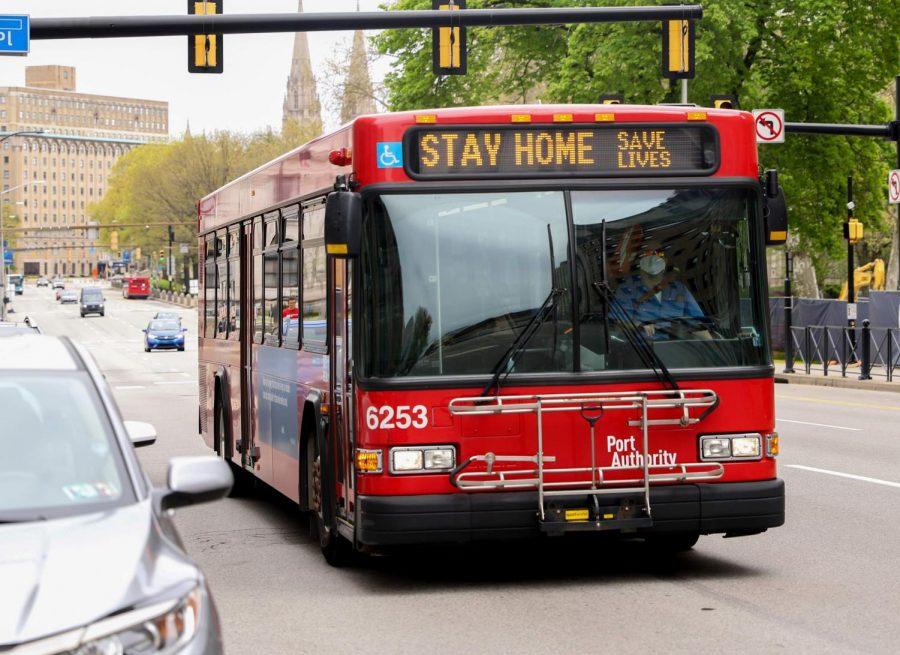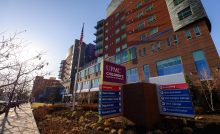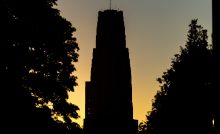PRT preps for Bus Rapid Transit with changes to Oakland routes


A PRT bus on Fifth Avenue.
Pittsburgh Regional Transit could change several bus routes through Oakland to accommodate the Bus Rapid Transit project, limiting service for some East End commuters and reducing connections to Downtown.
As part of the proposed changes, four buses that currently reach Downtown — the 61D, 71A, 71C and 71D — would instead turn around in Oakland using Craft Avenue. Eight other routes servicing Oakland may undergo minor changes.
While fewer bus routes will loop through Downtown, the BRT project will add dedicated bus lanes and upgraded shelters between Oakland and Downtown, plus improvements for bikers and pedestrians. PRT will designate five buses as “BRT” routes to serve a consolidated number of stops along Forbes and Fifth avenues.
The service changes would also end the outbound P3 route along the Martin Luther King Jr. East Busway at Wilkinsburg Station. Riders from Rankin and Swissvale would need to transfer to the P1 or ride the 61A from Hamnett, Roslyn or Swissvale stations to reach Oakland.
Transfers cost $2.75 for cash riders and nothing for ConnectCard users within a three-hour window. PRT spokesperson Adam Brandolph said the transfer would add five minutes of travel time compared to current service, while the 61A would add up to 12 minutes.
Some riders would see expanded service from this package of changes. The P3 route would extend to Uptown and Downtown via Fifth Avenue and begin running on weekends.
The agency is accepting public comment regarding these service changes until Feb. 1 at 5 p.m. Members of the public can use an online form, leave a voicemail or write to the PRT office to leave their feedback.
Pittsburghers for Public Transit wants riders who live and work in Oakland to make their voices heard through the public comment process.
“University workers and students are going to be impacted, some for better and some for worse in some of these service changes,” Dan Yablonsky, director of communications and development for PPT, said.
Amalia Tonsor, a Swissvale resident and graduate nurse, regularly used the P3 to attend classes and clinicals as a Pitt student, and will soon rely on it to commute to work in Oakland. Tonsor estimates that she spent a combined two weeks last year just riding the P3.
“For myself and many other care workers who work demanding schedules and have to leave the house very early and come home very late, asking us to take two buses is both not equitable and also not very realistic,” Tonsor said.
Though they’re seeking feedback from the public, PRT maintains that these changes to the P3 are necessary and minimally disruptive for riders.
“No one will be cut off from these changes,” Brandolph said.
Brandolph cited ridership patterns — only 15% of East Busway riders go further than Wilkinsburg Station — and the limited range of electric buses as reasons for the proposed changes. PRT announced plans in September to go fully electric by 2045.
The agency will continue to review service change options prior to their implementation in 2025, according to Brandolph.
PRT’s Title VI analysis of BRT-related service changes found that changes to the 61D, 71A, 71C and 71D would have a “disproportionate burden for low-income populations,” while cuts to the P3 route would have a “disparate impact on minority race and ethnicity populations.”
Title VI is a federal law that effectively requires transit agencies to evaluate potential discriminatory impacts on the basis of race, color or national origin from major service changes. The Federal Transit Administration mandates transit agencies include low-income populations in that analysis.
According to the report, the BRT project would mitigate the disproportionate hardships caused by service area reductions. The agency will begin work on the Downtown loop this spring, and will award the contract to construct the Uptown-Oakland portion in the fall.
PRT slated parts of Squirrel Hill, Highland Park and the Mon Valley for similar improvements, but later nixed these plans as cost projections soared. The agency expects the pared down project to cost $291 million.
Pearl Hughey, a Rankin resident and member of PPT, said it’s unclear why PRT continues to cut service in the East End to move the BRT project forward.
“You should not have to live in the city or be a high wage earner to have good transportation,” Hughey said. “I just want to understand. When they sit down and make these decisions, who’s at the table? Is there any representation for people who live in the east?”
Public comments may be submitted online at www.rideprt.org/brtcomments, via U.S. mail addressed to Pittsburgh Regional Transit or through voicemail by calling 412-566-5335
Recent Posts
A Good Hill to Die On // The motivation we all need
In this post of “A Good Hill to Die On,” staff writer Sierra O’Neil discusses…
Who Asked? // Is it really the damn phones?
This installment of Who Asked? by staff writer Brynn Murawski describes her brief journey limiting…
Students are ‘upset, but not surprised’ over denial of gender affirming care at UPMC CHP
Pitt students and LGBTQIA+ members express their concerns about the recent denial of gender affirming…
Take Madness Final Four | Battle of Pennsylvania, 412 and Just Outside of Philly clash
Welcome to the Final Four of Take Madness! We are down to four talented writers,…
Column | Best Sports Environments in Pittsburgh
Pittsburgh is undoubtedly one of the best sports cities in America. A deeply passionate fanbase…
Chalk is all the talk: Previewing the NCAA men’s Final Four
For the first time since 2008, all four first seeds have made the men’s Final…

